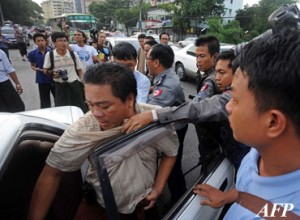Participation and Inclusion in Burma, Empty Words
By Burma Partnership • December 10, 2012 Today, 10 December marks the United Nations’ Human Rights Day. This year’s theme is inclusion and the right to participate in public life, but these concepts are conspicuously absent in Burma today, as recent events have proved.
Today, 10 December marks the United Nations’ Human Rights Day. This year’s theme is inclusion and the right to participate in public life, but these concepts are conspicuously absent in Burma today, as recent events have proved.
The Office of the High Commissioner for Human Rights (OHCHR) identifies inclusion and the right to participate in public life as “essential elements in achieving the full range of human rights for all of us… the fulfillment of the right to participate is fundamental to the functioning of a democracy and an effective human rights protection system. When the right to participate and inclusion are respected, each and every one of us is offered the opportunity to join in the debate, to offer ideas and to campaign for change.”
To commemorate this day, Daw Aung San Suu Kyi joined the OHCHR’s event in Geneva as the keynote speaker via satellite, serving as both an advocate for participation in public life and an example of a person and a place where this right to participation was, and in many cases still is, absent. One of the largest challenges facing Burma today and in the future is whether the government is willing and able to provide this basic human right of inclusion and participation to all of its citizens.
The right to protest is an essential component of inclusion and participation in a democratic society. As the brutal crackdown and arrest of protesters at the Letpadaung copper mine in Monywa shows, Burma still has a long way to go in achieving these principles. Over 7,800 acres of land has been confiscated from villagers for the copper mine, but when they raised their voices to protest, the government responded with violence and arrests. On 29 November, riot police fired water cannons, tear gas and incendiary devices at protest camps in Letpadaung, injuring more than 60 monks, many with third degree burns. Police also arrested eight activists in Rangoon who organized protests against the mine and the crackdown.
There exists a clear dichotomy between what the United Nations accepts as inclusion and participation and what is happening in Burma today. The UN High Commissioner for Human Rights, Navi Pillay, in her statement to recognize Human Rights Day, echoes exactly the concerns and demands of the Letpadaung protesters:
“They are asking for an end to a situation where governments simply decide what is best for their populations without even consulting them. They are asking for their right to participate fully in the important decisions and policies affecting their daily lives, at the international, national and the local levels. Many people in many countries have been making it clear they are fed up with their leaders treating them with disdain and ignoring their needs, ambitions, fears and desires.
“They have been, in effect, asking for what has been, for more than sixty years, under international law, rightfully theirs.”
The concern in Burma is that there will continue to be more words and no action, talk but no concrete improvements. While statements regarding inclusion and participation are made, protesters are attacked and arrested. As legal reforms are vowed, ethnic conflict rages, homes are burned and citizenship is denied.
How can one fully participate in society when decisions are taken behind closed doors, when state institutions answer to business cronies rather than its electorate and when the judicial system is used to silence the population? How can one participate when living in a war zone, in a refugee camp, or in devastating poverty? How can one participate when saying ‘my land has been taken, hear my concerns’ is greeted with violence and arrest? It simply cannot. This year again, Burma is not a place to celebrate human rights but to censure human rights violations.
Tags: Burma Partnership, Human Rights Violations, International Human Rights Day, Letpadaung Copper Mine, Monywa, ProtestThis post is in: Blog
Related PostsBurma Partnership Celebrates Continuing Regional Solidarity for Burma and Embraces the Work Ahead for Progressive Voice
Burma Army Displays Blatant Disregard for 21st Century Panglong Peace Process
Ann Din Coal Power Plant: Local Movement and Action to Preserve and Protect Natural Resources and Land: Mon IDP Report Case Study #4
Latest Human Rights Abuse Case Demonstrates Urgent Need to Reform the Myanmar National Human Rights Commission
Human Rights Far From Guaranteed as US Sanctions on Burma Are Removed









 All posts
All posts